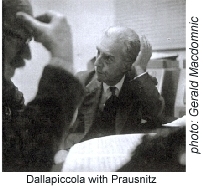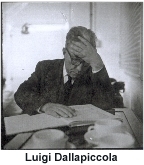| 1967 |
5 March: To Hamburg
for the premiere at the City Opera of Goehr's Arden Must Die. Renewed
acquaintance with Rolf Liebermann. D's review of the Goehr opera is
published in two parts in the TLS ,
March: contacts and
correspondence with Luigi Dallapiccola culminate in the plan for a
Music Today LP featuring his music, with other pieces by Busoni and
Stefan Wolpe. Dallapiccola is in London with D for a week of recording
sessions with Heather Harper, Barry McDaniel, and the London Sinfonietta under
Frederik Prausnitz. During the course of many informal discussions,
Dallapiccola raises the subject of Weill and the reactions of Webern to the
mention of his name. Dallapiccola's admiration for Die Dreigroschenoper
and his low opinion of Mahagonny have a direct bearing on the next fifty
thousand words of WEILL: LIFE & WORKS.
 |
|
 |
Autumn: In Frankfurt,
a second meeting with Adorno occurs in the immediate context of student
unrest. The next two years will be critical for Weill-reception in Europe and
the USA. The old concept of Weill as simply an adjunct of Brecht has gained new
currency with the emergence of an ideologically informed student and academic
culture. Lenya agrees that in this new situation the case for 'Weill without
Brecht' is best made by the music itself. Active promotion of performances
therefore acquires a new urgency. Although the Kurt Weill Foundation is
not officially concerned with such matters - being essentially a tax-saving
device - the legal and financial advisors who have brought it into being seem
to share Lenya's favourable view of D's practical initiatives - beginning with
the promotion of broadcasts and recordings of Weill's two virtually unknown
Symphonies.
5th and 6th "Music Today"
releases: Maxwell Davies, Goehr, Bennett,
Williamson; Weill (Symphonies)
|
| 1968 |
7th "Music Today" release:
Dallapiccola, Busoni, Stefan Wolpe. For EMI, two 'extra'
LPs (Gerhard and Maxwell Davies; Schoenberg,
Webern, Berg).
Extended discussions with the
American composer and conductor Gunther Schuller with a view to a triple
bill at the San Francisco Opera (General Director, Kurt Herbert Adler) for
which Schuller is orchestrating rather more than half of Weill's Royal
Palace (the original score being lost). Schuller himself conducts the
(successful) premiere in San Francisco on 5 October.
|
| 1968-70 |
Works with Josef Heinzelmann
on a performing edition of Weill's incomplete operetta Der
Kuhhandel (the original German-language version of the musical comedy A
Kingdom for a Cow). Christopher Shaw (a long-time student of classical
operetta and an admirer of Weill), undertakes the additional orchestration -
all with a view to a production in Dortmund which does not materialise.
Approximately 10 months' work is abandoned, including Shaw's masterly
orchestrations.
|
| 1969 |
November: Further to
recent discussions and correspondence with the choreographer Antony
Tudor regarding his ballet Shadowplay (based on the music of Charles
Koechlin and prompted by the 'Music Today' recording of Les Bandar-Log),
D submits to John Tooley (at the Royal Opera House, Covent Garden) a
proposal that Tudor be invited to choreograph the Royal Palace dances.
Frederick Ashton, in his role as Co-director of the Royal Ballet, and John
Lanchbery, the company's conductor, meet D in Fulham and listen to a
recording of the Royal Palace dances in one of the performances conducted by
Schuller. Both are impressed by the music, and actively interested in the
repertory possibilities.
|
| 1970 |
Karl Miller becomes
editor of the BBC weekly, The Listener, and invites Drew (who has been
contributing occasional music articles to The Listener over the past
decade) to collaborate with him on the editing of the weekly music columns.
Jo Elsendoorn,
Director of the Holland Festival engages D as Consultant for the 1971 Festival,
in connection with Kurt Weill events.
August: First visit to
Tanglewood and the Berkshire Music Center, of which Gunther Schuller is
Director. Meets Oliver Knussen (but not his fellow-composers Jonathan
Lloyd and Simon Bainbridge, the other British prize-winners at
Tanglewood this year). Further discussions with Schuller regarding Weill's
Royal Palace. |
|


